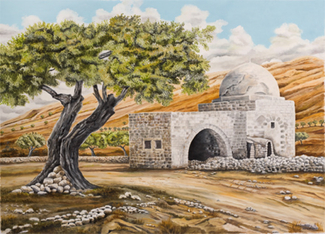 Rachel's Tomb
Rachel's Tomb The people we love who have died remain a powerful force upon us. The things they said and did continue to matter to us, and they continue to shape the things we say and do, long after they are gone. We want them to be present to us and we use prayers like the Kaddish to remember them even when remembering hurts.
This week's Torah portion (Vayechi) includes the death of Jacob and Joseph, but there is much earlier death that hangs like a shadow over the story.
When Joseph learned that his father, Jacob, was on his deathbed, he brought his two sons, Ephraim and Manasseh, to visit him. Jacob summoned his strength to sit up to give a blessing to the boys. But before he did, he told Joseph that he was adopting them as his own. He further explained that he was doing this because "when I arrived from Paddan, Rachel died by me while I was journeying in the land of Canaan ... and I buried her there on the road to Ephrat" (Genesis 48:7).
There is a mystery. Why did Jacob adopt Joseph's sons? What does it have to do with the death of Rachel, Jacob's favorite wife and Joseph's mother? Why does Jacob say that Rachel died "by me" or "upon me" (in Hebrew, עלי)?
It may be, as midrash teaches, that Jacob was responding to Joseph's desire to know for certain that his Egyptian-born children from an Egyptian mother would be included in the covenant of Abraham. It may be that Jacob sought to claim the boys as compensation for the many years he thought that Joseph was dead. It may be that he thought of Ephraim and Manasseh as the sons he would have had with Rachel if she had not died so young.
Ephraim and Manasseh were not just grandchildren to Jacob. They seem to have had deep symbolic meaning to him. They were, perhaps, reminders of the greatest grief and losses of his life. They were symbols he wanted to claim as his own, even as he approachedhis own death, to keep his lost love close in his memory and heart.
Jacob said that Rachel died "by me" or "upon me," and the seemingly superfluous word is the greatest mystery of all. It could mean that Rachel literally died at his side, that he was attending her at the moment when she succumbed during childbirth. It could be a statement of the depth of his sorrow -- as if he wanted to say how much the weight of grief was still "upon me." It could be an expression of guilt -- an acknowledgment that she may have died "on my account" because of the curse he unwittingly placed upon her (Genesis 31:32) when she stole her father's idols (Genesis 31:19).
So much happened between the time of Rachel's death and Jacob's blessing of Joseph's sons -- a passages of some 40 years or more. Joseph was sold into slavery and was presumed dead by his father. Joseph went from being the chief steward of a noble house, to being a forgotten prisoner in a dungeon, to being the second in command of all Egypt. A famine threatened the life of Jacob's entire family, forcing him to put the life of his favorite son at risk. The family was reunited and saved.
Through all of that, they never forgot Rachel. Her memory, her love, the trauma of her death, and the guilt associated with it, all of these clung to Jacob and Joseph through the decades. It was impossible for the two men to inaugurate a new generation of the family without invoking her name.
And that is what I hear when Jews come to the synagogue to recite the Kaddish. They invoke the names of parents, siblings, spouses and (God forbid) children despite the pain. There are no simple and clear reasons why. There is memory and love, sorrow and duty. There is sometimes regret and guilt. To the core of our being, we know they are with us and shape us, even decades after they are gone.
Other Posts on This Topic:
Funerals
Vayechi: Cloverleaf

 RSS Feed
RSS Feed
